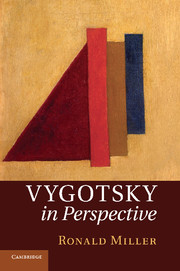11 - Vygotsky: mediation
Published online by Cambridge University Press: 21 April 2011
Summary
The structure of the sign: self- and other-regulation
Vygotsky draws heavily on Janet in his discussion of the development of signs. He takes as a starting point Janet's fundamental law of psychology ‘that in the process of development, the child begins to apply the same forms of behavior to himself that others initially applied to him’ (1997b, p. 102), and this provides the basis for the dual aspect of mediated processes in terms of other-regulation and self-regulation. In the context of this law, words or signs take on a special significance and, given the centrality of the role of signs in Vygotsky's theory, it is important to hear his thinking.
According to Janet, the word was initially a command for others, then it became a complex story consisting of imitation, changes in function, etc., and only gradually was it separated from action. According to Janet, the word is always a command because it is a basic means of controlling behavior. For this reason, if we want to explain genetically from what the volitional function of the word is derived, why the word subordinates motor reaction, what the origin of the power of the word over behavior is in both ontogenesis and phylogenesis, we unavoidably arrive at the real function of command. Janet says that the power of the word over mental functions is based on the real power of the superior over the subordinate; the relation of mental functions must be genetically attributed to real relations between people. Regulating another's behavior by means of the word leads gradually to the development of verbalized behavior of the individual himself.
(1997b, pp. 103–4)- Type
- Chapter
- Information
- Vygotsky in Perspective , pp. 369 - 417Publisher: Cambridge University PressPrint publication year: 2011



